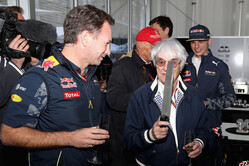


29/11/2018
NEWS STORY
 In the months that followed Liberty Media's purchase of F1, much was made of the fact that this 'new broom' would have a very positive effect on the sport, and that the fans would notice the difference.
In the months that followed Liberty Media's purchase of F1, much was made of the fact that this 'new broom' would have a very positive effect on the sport, and that the fans would notice the difference.
No sooner had Bernie Ecclestone been shifted stage left with a meaningless title and even less meaningful role than his successors were making clear that his dictatorial style of management was not for them.
Other than his dictatorial approach to management, the bosses also questioned the fact that basically the octogenarian was the man doing all the deals, be it securing new races, new sponsors or keeping the team in-line in readiness of the next Concorde Agreement.
Indeed, as the criticism of Ecclestone's approach continued, one wondered how it was that Liberty Media had paid $8bn for a business that had been so badly run.
Courtesy of fan surveys and various soundbites we learned that F1 was flourishing under its new management, which had great plans for the sport.
However, while we got a new logo (and font), a new theme tune, revised start time, a 'phantom' F1 team under the auspices of Ross Brawn aimed at creating the ideal formula, a plush new London HQ and a headcount to rival a midfield team, some of the other issues facing the sport remained far from settled.
After all the broo-hah-hah of the proposed engine regulations, aimed at simplifying the power units, reducing costs and thereby encouraging new manufacturers, we learned that essentially nothing will change.
New aero regulations to be introduced next year, ahead of a far more radical change in 2021, and intended to allow closer racing, are already looking likely to have little impact.
As written so many times before, the Concorde Agreement is far from settled, and with deal-busting issues such as the budget-cap - something that even Max Mosley couldn't get agreement on - and prize money, leaving the field as divided as much off-track as on, one can only say 'good luck with that'.
In the meantime, the Financial Times reveals that F1's pro forma core revenues fell 1% cent to $1.48bn in 2017, the first year under Liberty's ownership, with payments to teams falling 5%.
In the months following Liberty's purchase of the sport, much was promised but little actually delivered on. New races in America, Liberty's back-yard, haven't happened, though the sport will now go to Vietnam. This at a time, Silverstone is looking to drop off the calendar after 2019 along with a number of other iconic tracks.
Along with new races, the sport's new bosses, having criticised Ecclestone's failure to make the most of F1 in terms of sponsorship, making clear that this was a key target of theirs, though their cause was not helped by the loss of Allianz and UBS shortly after.
Along with retaining Heineken and adding Swiss engineering group ABB, Liberty has secured a controversial $100m deal with Interregional Sports Group (ISG) and Sportradar to enable live betting during races, a move that already has fans fearing that they'll be seeing betting odds appear on their screens and devices during races next season.
Approaching the end of its second season in charge, Chase Carey admits that in terms of its ambitions, the new management might have been somewhat naive.
"The perception was just there are sponsors waiting," he days. "They were lined up out there and as soon as we had somebody to go call on them, they were just going to sign up. The world's not that simple...
"We have a lot of discussions going on," he insists. "Obviously, we've got to turn them into partnerships, certainly, we hope to really take business from here to there by 2020."
Referring to the U-Turn on the engine rules, he says: "I think we actually became persuaded as we went (along) that the better path was... stabilising the current engine as opposed to creating a new engine," he admits.
"There's no question one of our goals, whether it's cars or engine suppliers, (is) to be inviting and (be) interesting to new participants, but not at the expense of our existing players."
Carey, like commercial boss Sean Bratches, comes from a broadcasting background, indeed, he was formerly Rupert Murdoch's top lieutenant and remains on the board of 21st Century Fox. Despite the initial excited reaction to that 'new broom' some feel that the American, having taken a control of a sport with which he had no previous connection, is out of his depth. Indeed, though his contract doesn't end until 2020 some are already questioning whether he will go the distance.
"Realistically, I've been around long enough to know growing anything or building anything is not easy," he says. "You don't win every battle, but I think we're winning more than we're losing. I think we're making headway."
Reflecting on the various claims made by F1's new management in those first few months, the approach does indeed appear to be more "realistic" now, as Carey realises the enormity of the task at hand.